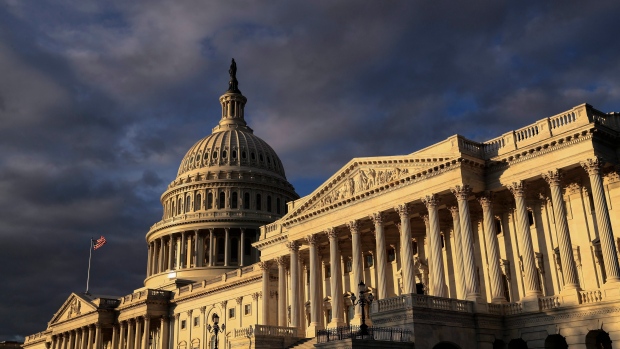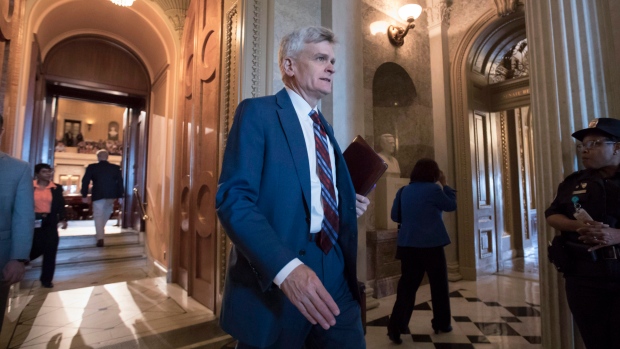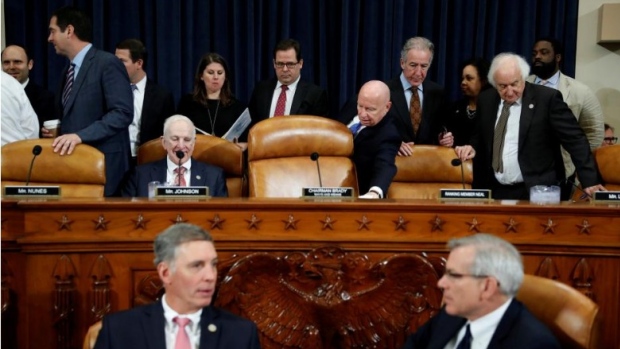Nov 9, 2017
U.S. stocks slide amid uncertainty over Trump tax plan
Reuters

WASHINGTON - Rival Republican tax-cut plans were emerging in the U.S. Congress on Thursday that differed on issues such as cutting the corporate income tax, the deduction for state and local taxes and the tax on inheritances paid by the richest Americans.
As the House of Representatives' tax committee put the finishing touches on its bill, momentum behind a Republican push for the biggest U.S. tax-code overhaul in decades was shifting to the Senate, where a separate proposal was set to be unveiled.
U.S. stocks hit session lows in early afternoon trading on Thursday and the Dow shed over 200 points on news of the delay.
At 12:37 p.m. ET, the Dow Jones Industrial Average was down 222.49 points, or 0.94 per cent, at 23,340.87, the S&P 500 was down 24.33 points, or 0.93 per cent, at 2,570.05. The Nasdaq Composite was down 90.50 points, or 1.33 per cent, at 6,698.62.
All three indexes ended lower on the day, but off their lows with the Dow at 23,461.94, the S&P at 2,584.62 and the Nasdaq at 6,750.05.
President Donald Trump, who took office in January and is still looking for a major legislative success, has made tax cuts a top objective, and congressional Republicans are aiming to pass the legislation by the end of the year.
The Senate plan, like the House version, would cut the corporate tax rate to 20 percent from 35 percent, but would delay this by one year until 2019, said Republican Senator Bill Cassidy, a member of the tax-writing Finance Committee.
Cassidy added that a repeal of the requirement under the Affordable Care Act, or Obamacare, that individual Americans obtain health insurance will not be included in the Senate plan being unveiled on Thursday.

Sen. Bill Cassidy, R-La., and other senators, gather for final votes on Capitol Hill in Washington, Thursday, Aug. 3, 2017 (The Associated Press)
House Speaker Paul Ryan said he would like to get rid of this so-called individual mandate, which is a key part of the healthcare law that Republicans have tried but failed to repeal, "any way I can." There were discussions about whether to include the provision in the House tax proposal, he said.
The Senate plan was expected to add less to the federal deficit and to be more appealing to moderate Republicans in that chamber, setting up the possibility that it, not the House plan, could become the version most likely to be passed ultimately by Congress, said analysts and lobbyists.
Wins by Democrats in state and local elections in Virginia, New Jersey and elsewhere on Tuesday increased the urgency for Republicans, who control both the White House and Congress, to make good on their campaign promises on taxes.
"We're going to get this over the finish line," Ryan said.
The House bill would repeal a deduction on federal income tax that Americans can now take for state and local income and sales taxes, but preserve the deduction for business owners. It would cap the deduction for state and local property tax paid at US$10,000.
The Senate plan was expected to repeal the state and local tax (SALT) deduction entirely, said analyst Henrietta Treyz of Veda Partners LLC. Either way, curtailing the SALT provision would hit taxpayers hardest in high-tax, typically Democratic-leaning states such as California, New York and New Jersey.
Lawmakers are looking at measures such as this to offset the revenue losses that would result from tax cuts.
Treyz also said the estate tax on inheritances - affecting only the wealthiest taxpayers - would be maintained by the Senate, not repealed gradually as the House proposes.
The Senate plan would close a loophole that allows private equity fund managers and other wealthy Wall Street financiers to pay the capital gains tax rate on their "carried interest" income, instead of the higher wage income rate, she said.
Republicans will need to prevent defections in their own ranks to get legislation approved given that Democrats are so far united in opposition, blasting the Republican proposals as giveaways to large corporations and the rich.

Members including Rep. Kevin Brady, centre, arrive for a House Ways and Means Committee markup of the Republican Tax Reform legislation on Capitol Hill in Washington, U.S., November 9, 2017. (Reuters)
'POLITICAL DOOM'
Senate Democratic leader Chuck Schumer said repeal of the SALT deduction and other provisions would hurt middle and upper-middle class Americans.
"Passing this plan won't help Republicans climb out of the hole they are in, it will bury them deeper ... this bill could be your political doom," he said on the floor of the Senate, where Republicans will need to be especially tightly united given their slim 52-48 majority.
The SALT issue could be pivotal. There are enough Republicans from higher-tax states in the House to torpedo the tax bill. In the Senate, Republicans may also need support from Democrats to pass their version.
Ryan indicated that the House will not simply pass whatever the Senate approves in order to get the bill to Trump, saying a House-Senate conference committee will have to work out differences between the two versions. The resulting compromise would need to be passed by both chambers before going to Trump to sign into law.
White House economic adviser Gary Cohn defended the Republican tax agenda as a model for trickle-down economic growth, saying it was aimed at boosting wages.
"We create wage inflation, which means the workers get paid more, the workers have more disposable income, the workers spend more. And we see the whole trickle-down through the economy, and that's good for the economy," Cohn told CNBC.
CEOs of big companies "all tell me how they excited they are to get a tax plan that makes the United States competitive," he added.
The latest version of the House bill would add US$1.7 trillion to the federal deficit over 10 years, the nonpartisan Congressional Budget Office said on Wednesday. That would violate a congressional budget rule requiring that the tax legislation add no more than US$1.5 trillion to the deficit.
Kevin Brady, Republican chairman of the House tax-writing committee, said he would revise the legislation on Thursday to bring it into compliance.